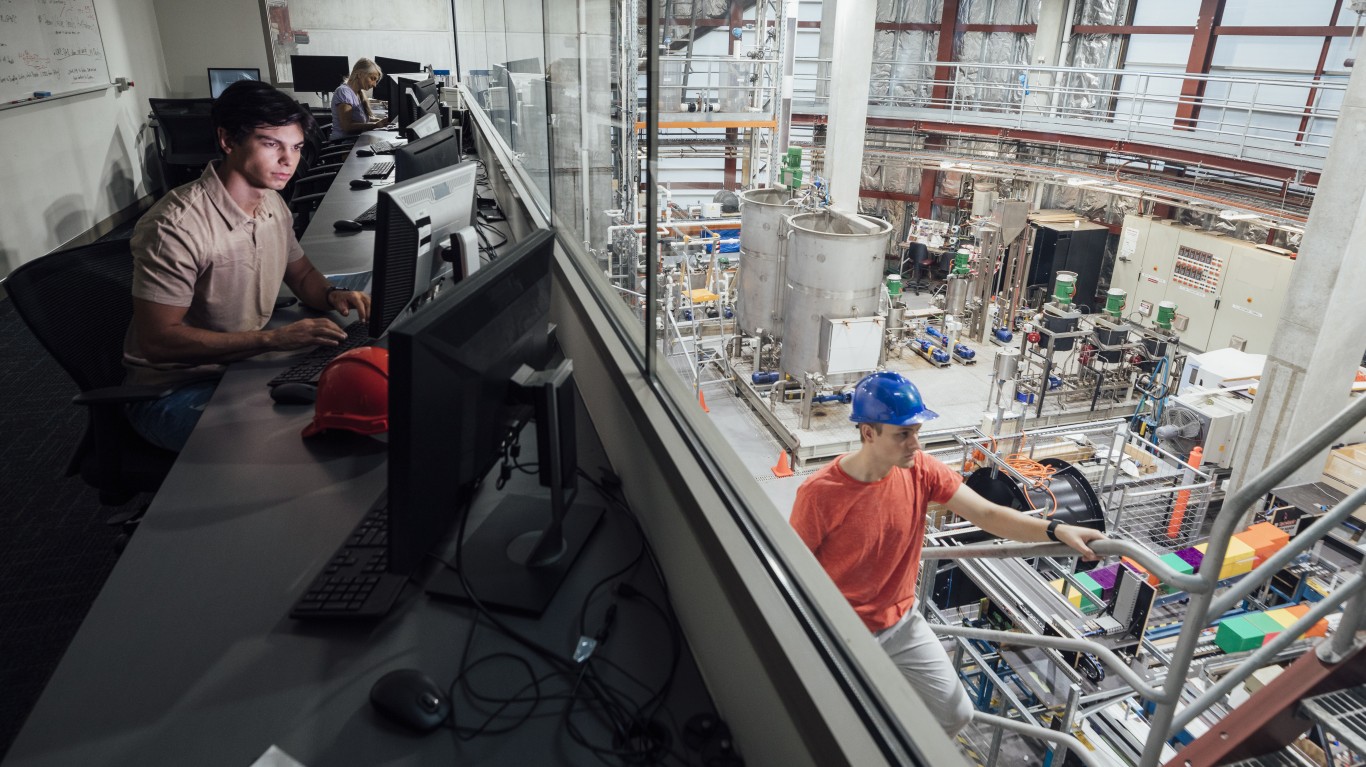
The decision to attend college is not always an easy one. While it could be an incredibly rewarding experience that introduces students to lifelong friends and provides them with education, it can also be incredibly expensive. However, attending college can open the doors to higher-paying careers, though future earnings may depend on the major taken. (Here are the most expensive colleges in every state.)
To determine the highest paying college majors, 24/7 Wall St. reviewed data on earnings from the U.S. Census Bureau’s 2021 American Community Survey Public Use Microdata Sample files. Undergraduate college majors were ranked based on the average reported incomes of degree holders in 2021.
Settling on a college major can be a daunting challenge and a stressful process. Several factors may contribute to the decision, including interests, passions, and probably future career options. One factor in the decision may be future earnings potential. Certain majors can set up graduates to have access to higher-paying jobs and being quite well off financially. (These are where America’s 25 richest billionaires went to college.)
Among the 25 highest-paying majors there are a few trends. Engineering, be it mechanical, chemical, electrical, or otherwise, can be quite a lucrative major when translated into a career. As can sciences majors, especially ones that can be relevant to the pharmaceutical industry and computing. (This is the strangest job in every state.)
Click here to see the highest paying college majors.
Click here to see our detailed methodology,

25. Physics
> Avg. annual earnings: $88,966
> Graduates with master’s degree or higher: 66.2%
> Unemployment rate: 2.9%
> No. degree holders: 445,906
[in-text-ad]

24. Physiology
> Avg. annual earnings: $89,480
> Graduates with master’s degree or higher: 60.8%
> Unemployment rate: 3.1%
> No. degree holders: 170,836

23. Construction services
> Avg. annual earnings: $89,620
> Graduates with master’s degree or higher: 11.1%
> Unemployment rate: 2.7%
> No. degree holders: 156,318

22. Business economics
> Avg. annual earnings: $90,830
> Graduates with master’s degree or higher: 31.7%
> Unemployment rate: 4.7%
> No. degree holders: 136,590
[in-text-ad-2]

21. Mechanical engineering
> Avg. annual earnings: $90,938
> Graduates with master’s degree or higher: 37.6%
> Unemployment rate: 3.0%
> No. degree holders: 1,337,625

20. Engineering mechanics physics and science
> Avg. annual earnings: $90,966
> Graduates with master’s degree or higher: 53.4%
> Unemployment rate: 2.6%
> No. degree holders: 48,647
[in-text-ad]

19. Aerospace engineering
> Avg. annual earnings: $91,063
> Graduates with master’s degree or higher: 49.4%
> Unemployment rate: 2.6%
> No. degree holders: 178,723

18. Management information systems and statistics
> Avg. annual earnings: $92,920
> Graduates with master’s degree or higher: 24.4%
> Unemployment rate: 3.8%
> No. degree holders: 324,791

17. Applied mathematics
> Avg. annual earnings: $93,950
> Graduates with master’s degree or higher: 48.7%
> Unemployment rate: 6.2%
> No. degree holders: 69,406
[in-text-ad-2]

16. Chemical engineering
> Avg. annual earnings: $94,868
> Graduates with master’s degree or higher: 46.0%
> Unemployment rate: 3.1%
> No. degree holders: 496,095

15. Materials science
> Avg. annual earnings: $96,246
> Graduates with master’s degree or higher: 62.6%
> Unemployment rate: 3.1%
> No. degree holders: 42,260
[in-text-ad]

14. Nuclear engineering
> Avg. annual earnings: $96,560
> Graduates with master’s degree or higher: 58.6%
> Unemployment rate: 1.3%
> No. degree holders: 25,684

13. Electrical engineering
> Avg. annual earnings: $99,708
> Graduates with master’s degree or higher: 46.1%
> Unemployment rate: 3.0%
> No. degree holders: 1,528,411

12. Biomedical engineering
> Avg. annual earnings: $99,782
> Graduates with master’s degree or higher: 49.8%
> Unemployment rate: 3.2%
> No. degree holders: 111,618
[in-text-ad-2]

11. Computer science
> Avg. annual earnings: $100,075
> Graduates with master’s degree or higher: 30.8%
> Unemployment rate: 3.8%
> No. degree holders: 1,863,240

10. Economics
> Avg. annual earnings: $101,421
> Graduates with master’s degree or higher: 43.0%
> Unemployment rate: 4.2%
> No. degree holders: 1,677,144
[in-text-ad]

9. Finance
> Avg. annual earnings: $102,169
> Graduates with master’s degree or higher: 29.6%
> Unemployment rate: 3.2%
> No. degree holders: 1,682,131

8. Biochemical sciences
> Avg. annual earnings: $102,789
> Graduates with master’s degree or higher: 61.6%
> Unemployment rate: 2.6%
> No. degree holders: 342,809

7. Petroleum engineering
> Avg. annual earnings: $104,727
> Graduates with master’s degree or higher: 24.3%
> Unemployment rate: 7.7%
> No. degree holders: 37,704
[in-text-ad-2]

6. Genetics
> Avg. annual earnings: $104,920
> Graduates with master’s degree or higher: 64.5%
> Unemployment rate: 2.9%
> No. degree holders: 28,844

5. Actuarial science
> Avg. annual earnings: $105,464
> Graduates with master’s degree or higher: 25.5%
> Unemployment rate: 1.7%
> No. degree holders: 28,763
[in-text-ad]

4. Health and medical preparatory programs
> Avg. annual earnings: $106,243
> Graduates with master’s degree or higher: 75.0%
> Unemployment rate: 2.4%
> No. degree holders: 160,889

3. Computer engineering
> Avg. annual earnings: $112,291
> Graduates with master’s degree or higher: 37.8%
> Unemployment rate: 2.9%
> No. degree holders: 520,750

2. Molecular biology
> Avg. annual earnings: $113,439
> Graduates with master’s degree or higher: 62.1%
> Unemployment rate: 2.3%
> No. degree holders: 124,600
[in-text-ad-2]

1. Mathematics and computer science
> Avg. annual earnings: $116,049
> Graduates with master’s degree or higher: 48.6%
> Unemployment rate: 1.8%
> No. degree holders: 28,482
Want to Retire Early? Start Here (Sponsor)
Want retirement to come a few years earlier than you’d planned? Or are you ready to retire now, but want an extra set of eyes on your finances?
Now you can speak with up to 3 financial experts in your area for FREE. By simply clicking here you can begin to match with financial professionals who can help you build your plan to retire early. And the best part? The first conversation with them is free.
Click here to match with up to 3 financial pros who would be excited to help you make financial decisions.
Have questions about retirement or personal finance? Email us at [email protected]!
By emailing your questions to 24/7 Wall St., you agree to have them published anonymously on a673b.bigscoots-temp.com.
By submitting your story, you understand and agree that we may use your story, or versions of it, in all media and platforms, including via third parties.
Thank you for reading! Have some feedback for us?
Contact the 24/7 Wall St. editorial team.
 24/7 Wall St.
24/7 Wall St. 24/7 Wall St.
24/7 Wall St. 24/7 Wall St.
24/7 Wall St.
